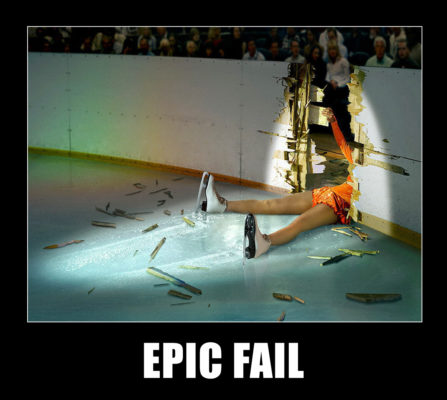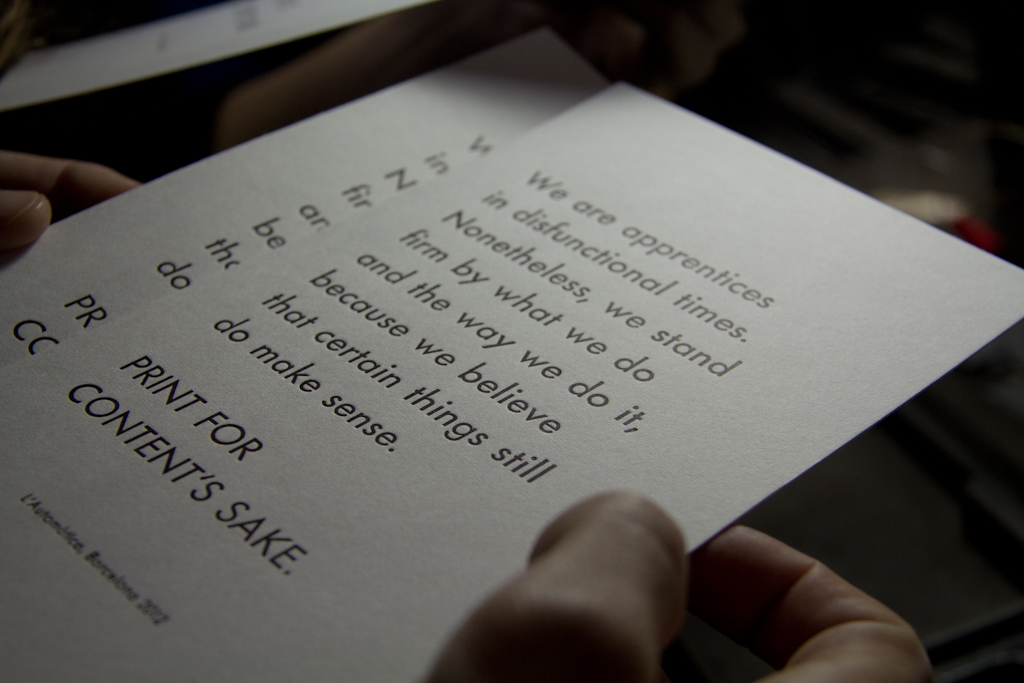Search
To search for an exact match, type the word or phrase you want in quotation marks.
A*DESK has been offering since 2002 contents about criticism and contemporary art. A*DESK has become consolidated thanks to all those who have believed in the project, all those who have followed us, debating, participating and collaborating. Many people have collaborated with A*DESK, and continue to do so. Their efforts, knowledge and belief in the project are what make it grow internationally. At A*DESK we have also generated work for over one hundred professionals in culture, from small collaborations with reviews and classes, to more prolonged and intense collaborations.
At A*DESK we believe in the need for free and universal access to culture and knowledge. We want to carry on being independent, remaining open to more ideas and opinions. If you believe in A*DESK, we need your backing to be able to continue. You can now participate in the project by supporting it. You can choose how much you want to contribute to the project.
You can decide how much you want to bring to the project.

VISTA ORAL: In keeping with our trajectory of useless projects, we’ve been asked to write an editorial for A*DESK and we’ve chosen FAILURE as our theme. Perhaps simply for clinical reasons, perhaps because of our resistance to accept certain logics that seem to be enforced by the context in which we live. Paradoxically, we’ve thought of you, as we did when we were commissioned the publication entitled CAGADAS,[1] because of the will self-managed projects have to last. Our perseverance doesn’t obey the neo-liberal reasonings that uphold the dichotomies of success and failure. Anyway, you describe it as you like.
RICARDO DUQUE: My dears, the truth is that it would be great if we could turn this into an interview, find more specific subjects and pose them as questions, so that the two of us can string together an interview or an interesting text. The theme of failure can be addressed from several different angles. Effort is always implicit in failure; this is its process. Sometimes processes are everything and, in the end, results close cycles. In most of these projects in which I’ve been involved – and still am involved! – I think it’s more a question of resilience. On the other hand, we have the spectacle of failure. I’m a fan of this branch of memes that revolve around failure, the classical epic fail.
I also like to think about failure in terms of whether or not something that isn’t heading towards success should be considered a failure. In other words, when its purpose isn’t what is conventionally known as to succeed. Perhaps this is the only way in which new paths can be created, new ways of doing can be presented and new questions can be asked.
I’m not sure where you’ll take this, but we’ll see whether any of these paths give you ideas. I don’t know whether you’d like to talk about specific projects or ways of doing in which I’m involved, or whether you prefer that we discuss these topics more generally, as if we were having a beer.
VO: Ric, how do you feel about this being more a conversation than an interview? We’re not very good at the interview format, and believe instead that if we string your ideas together with ours it could work. What do you think?
RD: Yes, I think that’s a great idea! How should we begin? For a start, do you like any of the ideas we’ve just mentioned?
VO: When we think of failure or uselessness, what we find interesting is defeat in itself, dysfunction and disaster, not as a slip-up in the process of learning, but as an end in itself; a political stance that defends the lack of success as a space of resistance where other things can emerge. We don’t only see ourselves as travelling through these spaces of resistance but of actually creating and pursuing them with surprising resilience and enthusiasm, defending them through self-management as truly independent spaces that far transcend the limits of the pragmatism of capitalist logics.
We hadn’t thought of the spectacle of failure, but there really is a sort of aesthetic of the loser, a telematic sharing of epic fails. If you want to follow this drift, that’s fine. The fact is we’d like you to talk about whatever you prefer; there’s no specific object.
RD: The truth is that to a certain extent this text contains one of the most effective recipes for failure: showing the processes and guts of the drift, trying to do so collectively, diluting responsibility — the disease of everything collective. In some measure, reading what we’ve just written as a quest and your decision to make the process public and transparent, I have the feeling that this already is an interesting text on failure. What are these epic fails if not dirty linen that a ‘friend’ decides to wash in public, revealing the guts of our creative process at a distance, with no set destination, like a streamed conversation between drunks in a bar.
But what is this success that rises proudly on the other side of the dichotomy, in opposition to failure? Social media, advertising, films and all the visual noise to which we are subjected are full of emulations and parodies of something that appears to be considered as success but, to tell you the truth, I don’t find it either attractive or appealing, quite the opposite in fact. In my personal experience, I think that if the world is drifting in a current controlled by neo-liberal rules, the best and most satisfactory thing to do is to move to one of the backwaters formed between the rocks on the banks of the river. Yet the rocks have to be built, and from there we see the frenzied spectacle from another angle. From that of failure? Maybe, but if the prize is to enter the stream and win the race, I’d rather stay in these micro-habitats we’ve built (all of them with the help of many others) and enjoy what really moves me to use my ‘mental bandwidth’.

Dinou, a publication distributed at the demonstration held on 19 June 2011 in Barcelona. This spontaneous publication compiled phrases, ideas and conversations collected during the first few months of the anti-austerity or 15-M movement that emerged in Barcelona’s Plaça Catalunya in 2011.
VO: To a certain extent, to create these dichotomies is to speak from a bipolar position that dissolves multiplicities and that, as you rightly say, separates them from the collective.
Apparently, this separateness isn’t characterised by conditions that favour or hinder success or failure, as if everything obeyed our individual decisions and these were not influenced by social class, gender, race and countless variables that bring more or less violence.
To speak of failure is also to call into question who decides value and from what position. Even so, being able to move to one side in order to avoid feeling crushed by a system that rewards ‘good deeds’ is sometimes difficult, particularly when these rewards are economic, which is often the case, and determine our lifestyles in a capitalist system. What is clear is that our inevitable contradictions depend on these micro-habitats or micro-worlds that seem capable of generating – or at least interrupting – given temporalities.
RD:Indeed, our lives as losers require a good measure of inventiveness. If our innermost convictions and interests (that I call ‘engines’) are undeniable and we have to live together in the liberal race of the system, we are constantly making changes, creating niches that allow us to enter and exit the track.

Work typeset in lead type and printed like an ‘express manifesto’ at L’Automàtica in 2012.
At the end of the day, both success and failure are the result of a judgement, as you’ve said. It’s hard to avoid being affected by judgement, but I see it as an opportunity to look from a different perspective, consciously. It would seem as if we were obliged to compete in a race against our will in order to drop what we’ve gathered into the ‘engines’ of failure, but in my opinion, if these niches or micro-habitats are constructed and reinforced through reflection then they become free, restful spaces that allow us to eagerly join the race, obtain what we need and return. That is, I like the idea of contemplating the dreadful race with the eyes of the hacker. Failure well understood is merely a good hack of the system.
VO: We like this idea of hacking the system, which simultaneously implies hacking our own judgement, as if failure were a choice; as if it didn’t act like a sort of categorical imperative, a sort of voluntarily self-imposed discipline against which we must learn to honour our failures, to claim victory before disappointment, to conquer frustration — in short, to inhabit contradiction without fear or hope.
[1] Cagadas is a title produced by Vista Oral and published by Los cinco delfines that will appear in 2019.

"A desk is a dangerous place from which to watch the world" (John Le Carré)